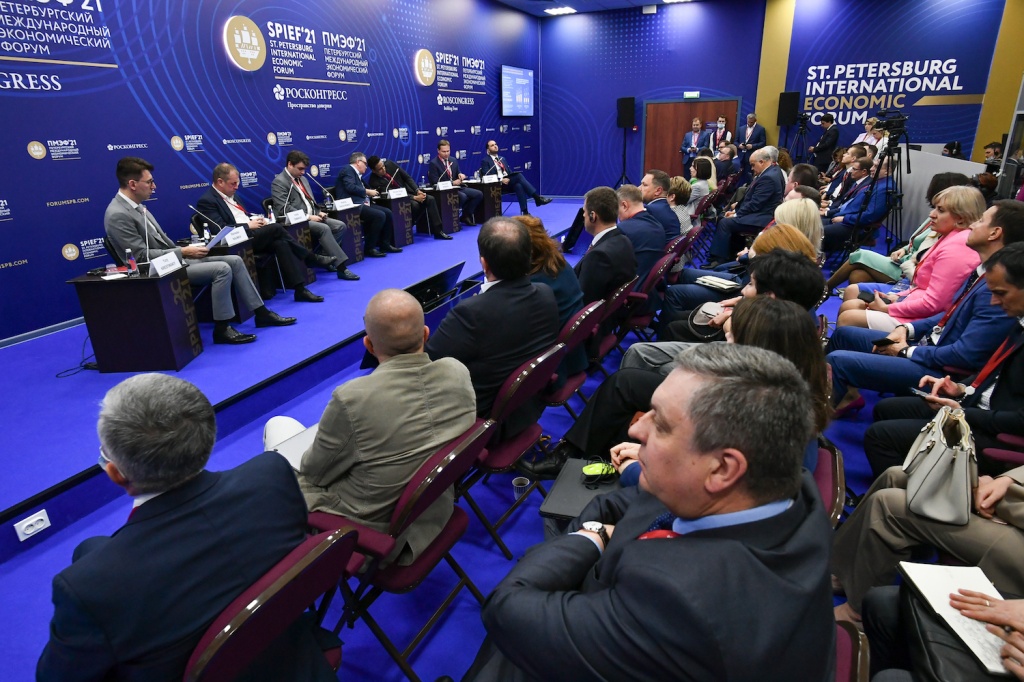
Victor Fisenko, the First Deputy Minister of Health of the Russian Federation, Vasily Osmakov, the First Deputy Minister of Industry and Trade of the Russian Federation, representatives of leading pharmaceutical manufacturers, innovative drug developers, and Russian leading industry specific universities met at the panel session «Strategies to develop the Russian pharmaceutical industry and ensure national drug safety and security» to discuss the main issues of the national pharmaceutical industry development.
During the discussion, the participants came to the main conclusion that even large domestic pharmaceutical manufacturers, research centers, and universities need an active coordination and support from the state at all the stages of the pharmaceutical product life cycle, starting from its development (R&D), transfer of the product to an industrial partner, and its further launch in the market. The panel session participants agreed that the state should play a more significant role in the future, in terms of the challenges and tasks that it has to address.
In his speech, the Head of Pharmasyntez named key areas where a more close cooperation between science, business and government is needed. His proposals referred to the development of new innovative drugs as the market of generic drugs only won’t allow pharmaceutical companies develop effectively and invest their own funds in the development of new drugs. They need a strong state support and, above all, funding of preclinical and clinical studies.
Also, the country needs a full-cycle large-scale production of domestic drugs. This is a guarantee of the country's drug security. And it can be ensured only when a wide range of pharmaceutical substances is manufactured in Russia.
Vikram Punia also emphasized in his speech that the state should support certain promising mega-projects in the pharmaceutical industry with a total investment amount of tens of billions of rubles. It is these breakthrough mega-projects that will bring a number of Russian pharmaceutical companies into the TOP-100 in the world.
Andrey Ivaschenko, Chairman of the Board of Directors of ChemRar High-Tech Center, underlined that it was important to preserve the achievements made in the Regulatory Affairs field in the past 1.5 years (during the coronavirus epidemic period) such as accelerated approval of drugs in high demand.
Alexander Mazhuga, Rector of D. Mendeleev University of Chemical Technology of Russia, placed a particular focus on the issue that a state support to science and well-trained staff are needed for the pharmaceutical industry to be able to reach its current goals. He gave an example of N. F. Gamaleya Federal Research Center for Epidemiology and Microbiology, when a small state funding allowed it to further develop the products the institute had before the pandemic. As for training the personnel for the industry, A. Mazhuga believes that the development of such projects as “Mendeleev Valley” and some others will provide the industry with specialists in high demand.
Alexander Semenov, President of Active Component, JSC, announced that two thirds (more than a half) of drugs produced in Russia are domestic ones, but, in terms of money, they account for 30–35% profitability. He noted the situation needs to be changed. The production of domestic equipment and components for finished drugs, primarily pharmaceutical substances, will be a key factor of success.
All the discussion participants noted that, over the past 10 years, the Russian pharmaceutical industry has achieved high results in the implementation of the Pharma-2020 Program and, in many respects, this success was due to the active support of the Ministry of Industry and Trade of the Russian Federation. As Vikram Punia said, four of five Pharmasyntez Group plants were built with the active support of the Ministry of Industry and Trade of the Russian Federation and the Industry Development Fund of the Russian Federation. However, additional measures are needed and the Pharma-2030 Program should be launched as soon as possible.
Vasily Osmakov, the First Deputy Minister of Industry and Trade of the Russian Federation, said the Ministry of Industry and Trade will continue to support pharmaceutical manufacturers. Victor Fisenko, the First Deputy Minister of Health of the Russian Federation, in his turn, emphasized that the position of the Ministry of Health is to promptly provide the domestic market with high-quality and effective medicines. To implement this goal, a number of timely regulations is being drafted to provide patients with affordable drugs.
